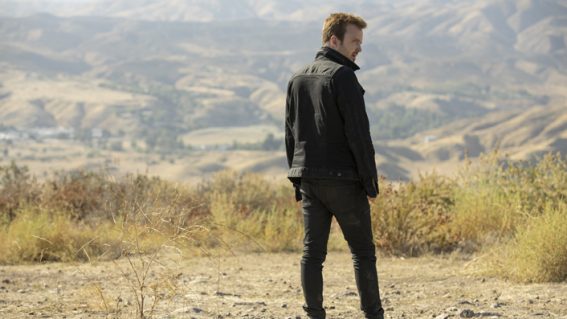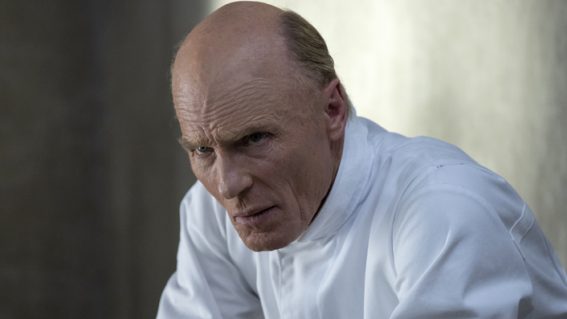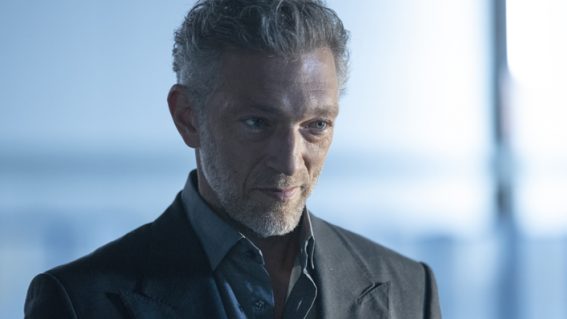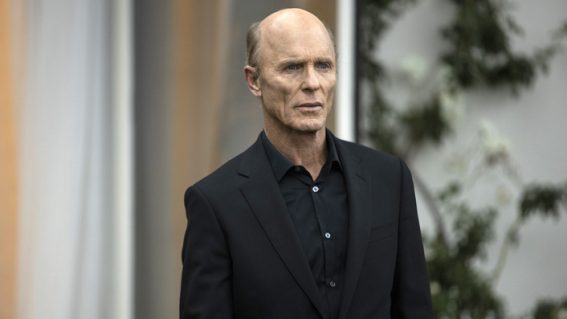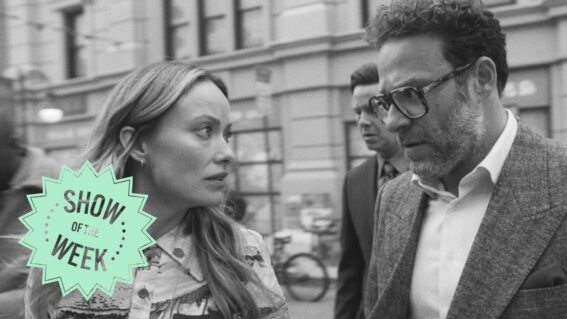In the first episode of Westworld season 3, revolution is in the air
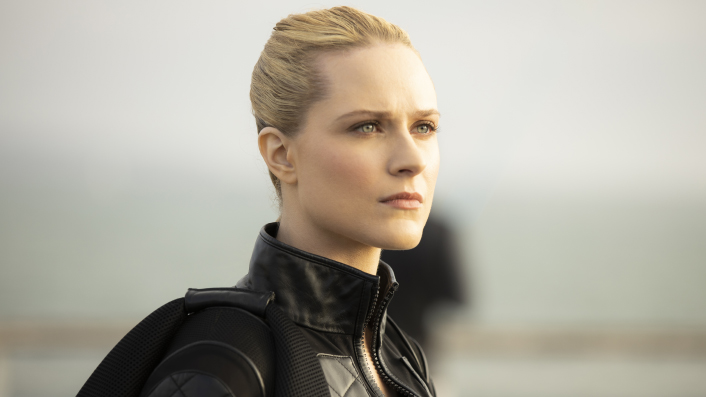
Westworld has returned to Neon, with the first episode of season three now available to stream. Tony Stamp rolled up his sleeves for this thorough recap (containing a multitude of SPOILERS, natch). If you need a refresh on where things left off at the end of season two, check out his catch-up post and get reacquainted with the characters and storylines after two seasons of wonderfully challenging viewing.
About halfway through this new episode of Westworld, a character posits a theory: we’re all living in a simulation. It’s an idea that runs through a lot of dystopian sci-fi (The Matrix being the obvious example), but here it’s tied specifically to a certain theme park we’ve spent two seasons getting to know—one which housed a different type of simulation. “At least the Delos fuck-puppets had the dignity to revolt and kill everyone” the man goes on to say.
Revolution is in the air.
Through this first instalment of season three, we learn that people in this future society aren’t free, exactly. It’s a world run on algorithms, operated by higher forces. Dolores may have escaped the park, but she’s discovered a much bigger system of control. Later on, Aaron Paul’s character Caleb recalls his friend’s words: “They built the world to be a game. And then they rigged it so they always win”.
It’s easy to see the kind of present-day political anxieties the showrunners are tapping into.
Howdy pardners! Welcome to our first Westworld season three recap. And what a start—it’s an episode that doesn’t so much canter onto the prairie, instead it does a burnout on a future-bike and blasts us through a tour of the world circa 2054 (according to the teaser trailer) along the way. There’s a lot of heavy lifting done this episode, which sets up what looks to be the main struggle of the season and lets us know where most of our major characters have wound up, months after the bloodbath at Delos’ parks.
It really does feel like a different show. Seasons one and two tended to play coy and insular, as we only saw things the Hosts were privy to. But here the curtain is pulled right back. There are still mysteries to be solved as we plunge into future-China, LA and London, but there’s no sign of a fractured timeline. In fact, the show goes to some pains to make it clear what’s happening, and when it’s happening.
Also, the player-pianos are gone. The score now is all muscular Blade Runner synths and pounding drums.
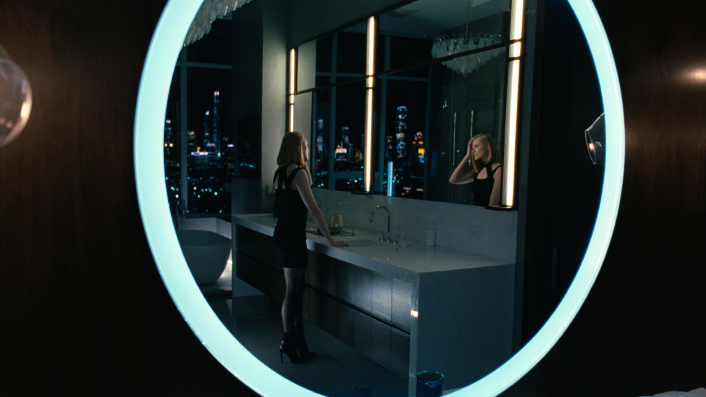
Scene one plays out like a little morality play, as a Delos shareholder’s crimes are outlined and punished by Dolores (Evan Rachel Wood), stalking his mansion like an avenging angel. We’re told this is happening in Beihai, China thanks to the wheel of data (also seen in the teaser) that starts things off. A ‘divergence’ is taking place. The eerie music cue that plays reminded me of another sci-fi heavy-hitter—Alex Garland’s film Annihilation (deep cut for the music nerds—it’s actually [pretty close to] the ascending piano line from Westworld’s opening credits, played in reverse. We’re through the looking glass, people).
Turns out the Delos fat-cat has met Dolores before, in the park, during his bachelor party. She tells him he had some anger to work out, and we can infer the rest. But his bad impulses have stayed with him, and his wife paid the price. “It’s hard to break our loops”, reflects Dolores, hair slicked back from his pool and looking startlingly like a robot Catherine Tramell.
As the unnamed German has visited Westworld, that means Dolores has read his ‘book’—all the data about him that Delos collected. She takes his money, and a boatload of data from his former employee, a company called Incite. Then she orchestrates his death to reflect that of his wife’s, who he murdered. As the scene plays out there’s world-building aplenty: hologram glasses, some sort of disc he clicks into his mouth when he wants to sleep, and an all-encompassing security system powered by A.I.
“You want to be the dominant species but you built your whole world with things like me” notes Dolores, overcoming a locked door with a touch of her hand, and repurposing his glasses to show visions of his dead wife. She goes on to explain that she needs his data for a competitive advantage: he’s witnessing the birth of a new species.
Dolores spends the rest of the episode getting close to Liam Dempsey (who she met in Burma apparently). He’s the son of the man who spent fifteen years designing Incite’s system of control. We even see its crown jewel: a huge orb of blinking red lights called… Rohoybin? I didn’t catch the spelling. It’s a massive computer of some kind, and its owners have lost track of how many thoughts it has per second. “Thoughts?” asks Dolores.
“Strategies” responds Liam.
He is feted for “saving the world through algorithms”, and when Dolores joins him in a future-copter and they gaze down at L.A. (one of many times we’re treated to a glorious, beautifully-realised vista of a future city, skyscrapers engulfed in foliage), she suggests Incite “controls all of it. Even the traffic”.
Well, not quite. “Just the technology”, Liam corrects her.
It becomes apparent that the wheel of data we keep seeing is a visualisation of Rohoybin’s inner workings, and the anomalies it detects are our escaped Hosts. When Pom Klementieff (Mantis from Guardians of the Galaxy Vol. 2) shows up (working for the man who actually controls everything—Liam is just a figurehead), we learn that someone has been hacking into the system. Watching Dolores summon various technologies to do her bidding, we can guess it’s her.
By the end she’s replaced Liam’s Scottish Head of Security with a Host doppelganger (piloted, we assume, by one of the pearls she smuggled out of Westworld), and laid waste to a lot of his team in a terrifically orchestrated series of action scenes (one set to Pulp’s Common People, both thematically on point and so pulse-raising you wonder why no one’s done it before).
It’s worth noting that the Scottish doppelganger repeats its counterpart’s words back to him: “I can’t imagine anyone’s going to miss you”.
He’d whispered the same to Dolores not that long ago, so presumably our Host was nearby eavesdropping? Or do they share ears? Dolores’ final words to him though, reveal the real thrust of this show: “You were free. You had no god. But you tried to build one. The real gods are coming. And they’re very angry”.
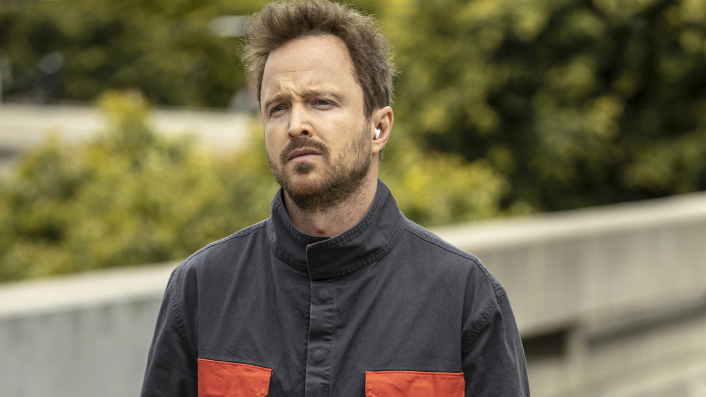
And as we arrive at the credits she’s finally crossed paths with the lead character who makes his debut this episode: Aaron Paul’s Caleb. He’s a war vet (can’t wait to find out where this future-war took place), who works construction with a robot he keeps secure with a bike lock, and makes ends meet using a crime app that invites you to ‘make money motherfucker’, deeming you ‘basic’ if you refuse.
Caleb’s story ties nicely into the themes of control; he’s unable to make ends meet by honest means, has to support his mother (who seems to have Alzheimers) and sees a therapist (presumably to treat PTSD). He bemoans a world run by algorithms to his dead army buddy Francis (the reveal that Francis’ phone calls are a form of A.I. therapy counts as the episode’s main twist, although it’s pretty obvious by the time we get there), and says Incite may have given the world a coat of paint, but inside it’s still rotting.
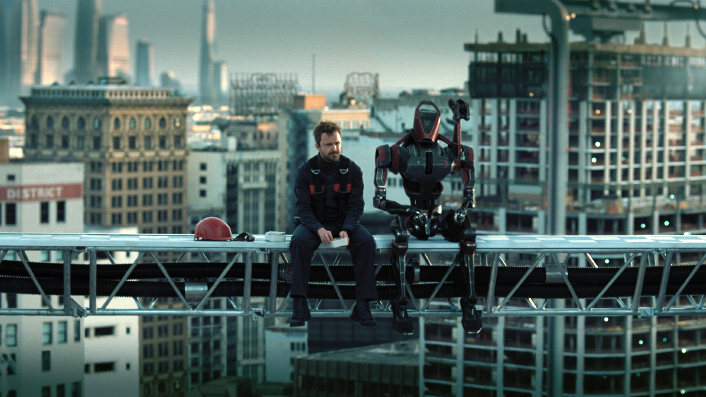
He feels as trapped as Dolores once did. Everywhere he goes he’s aware of being ‘logged’—although this is offered temporary reprieve by Lena Waithe (Master Of None, Ready Player One) and her device that not only knocks out cameras and ‘loggers’ but blasts everyone’s earpieces with Death Grips (of all things), as Caleb and co. are allowed a moment of slow-motion crime-doing cool.
He eventually tells A.I. Francis “If I’m going to get on with my life I’m gonna have to find someone real”, and because we know how TV works we realise that someone will be Dolores, and because we know what this show is about, we know that statement (particularly the word ‘real’) is very loaded. We leave our main pair together in an underpass, Caleb calling for help as Dolores bleeds from a gunshot.
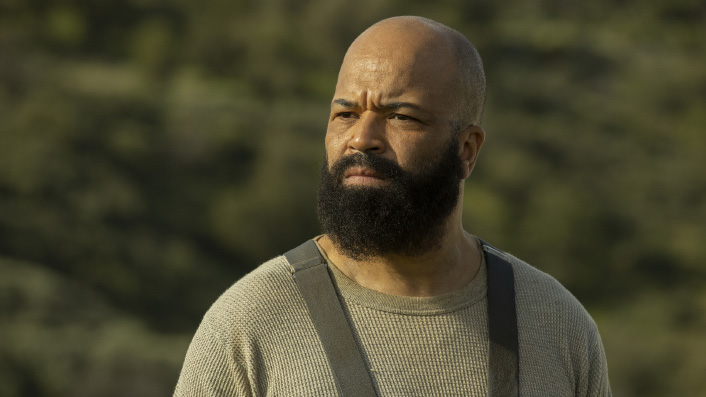
Meanwhile, Bernard (Jeffrey Wright) has set up camp somewhere on the mainland (a sign near the end says he’s on Palawan Island, which Google tells me is in the Philippines). The massacre in Westworld has been pinned squarely on him, so he’s hiding out in a meat-packing plant (even this is realised via wonderful futuristic production design—this show must cost a fortune), using the name Armand Delgado and sporting a magnificently swollen beard. Near the end he’s rumbled by two observant co-workers, leading to the episode’s biggest question mark.
We see Bernard push a button on a small device he keeps in his pocket, and this button seems to switch him between two modes: the Bernard persona and something deeper and more primal. He asks this other self not to hurt the two workers too badly, then pushes the button and goes absolutely beast-mode on them, killing at least one. Earlier we saw him with a familiar wire in his arm, running through his own code and conducting “trial 342”. He suspects someone has been messing with his programming.
“Would you ever lie to me Bernard?” he asks himself.
“No” comes the response.
Prior to him brutalising the two meat-packers, Bernard begs with them “I can’t stop her! I can’t save any of you!”, reminding us of his real mission to stop Dolores’ presumed genocide.
The final shot pre-credits sees him heading back to Westworld, a development I hope is temporary—the amount of forward momentum in this episode is staggering and I want it to continue.
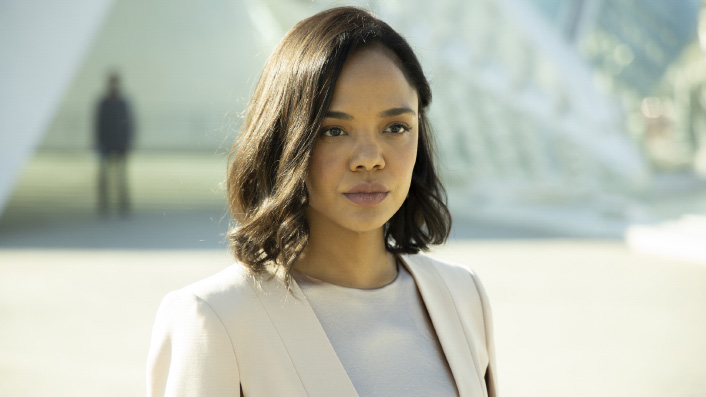
The other character we spend the most time with is Tessa Thompson’s Charlotte Hale (or whoever is piloting this Host version of her), chairing meetings as the interim Delos CEO and ordering the board to get started on producing new Hosts for the parks—a decision that’s met with obvious outrage, considering they murdered 113 people just three months ago. In the episode’s least subtle line, she tells them “Robots don’t kill people, people kill people”.
There’s an empty seat at the table that we can guess belongs to William (Ed Harris aka The Man In Black, who is absent from this ep). He’s left a ‘machine proxy’ to make decisions on his behalf. It concurs with Charlotte. If she can commune with technology the way Dolores seems to then that’s probably why.
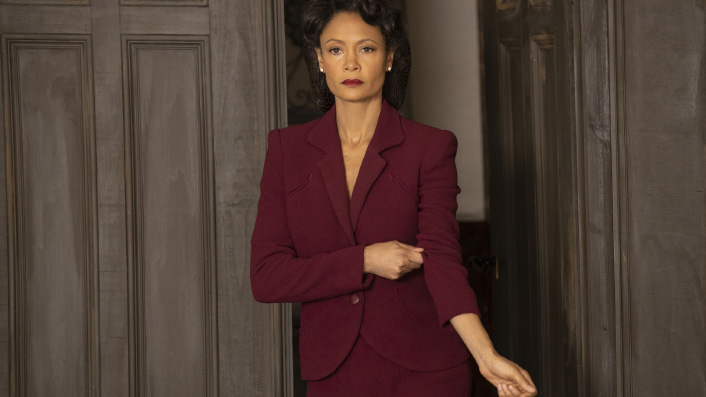
And then post-credits we’re treated to our first look at Maeve, coming back online in a park that replicates Nazi-occupied Italy. Oh, these rich future-people and their strange whims! While it’s a bit disappointing seeing her back in a park’s narrative, I look forward to her busting out of there.
To reiterate, it really feels like the training wheels are off this show. It’s grappling with big ideas, and it feels huge, not just globe-trotting but presenting a clearly thought-through vision of the future. Some examples I didn’t get to: Caleb’s fellow crim whose t-shirt spells out which emotion he’s feeling; the A.I. phonecall telling Caleb he didn’t get a job, and my personal favourite moment: Dolores’ black dress morphing into a gold gown with a tug (as a piano version of Massive Attack’s Dissolved Girl morphs into the real thing—thematically on point once again).
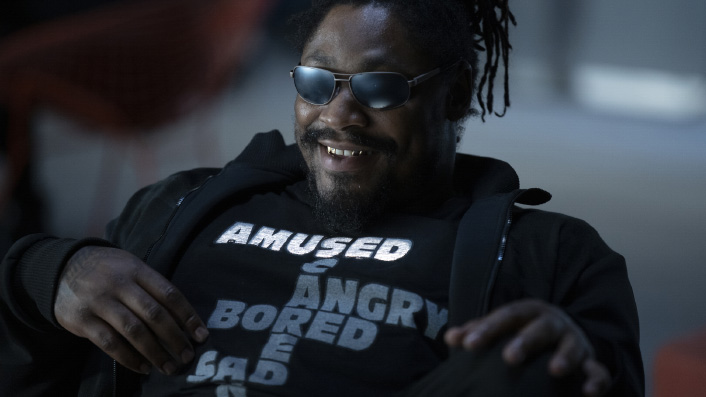 Evan Rachel Wood and Aaron Paul deliver brilliant performances—he’s as put upon and desperate as you’d expect, and she gets to show a whole new range of colours—predatory, curious, cool. The action is a highlight too, and has more immediate stakes now that we’re in the real world, and not just dealing with six-shooters.
Evan Rachel Wood and Aaron Paul deliver brilliant performances—he’s as put upon and desperate as you’d expect, and she gets to show a whole new range of colours—predatory, curious, cool. The action is a highlight too, and has more immediate stakes now that we’re in the real world, and not just dealing with six-shooters.
I’m eager to see where we end up next week, and curious to hear what you all thought—are you similarly excited about the show’s new approach, or do you miss those dusty saloons? We’re already an eighth of the way through this slightly shorter season, and have covered so much ground already. Revolution is in the air, and it feels like we could end up anywhere.



